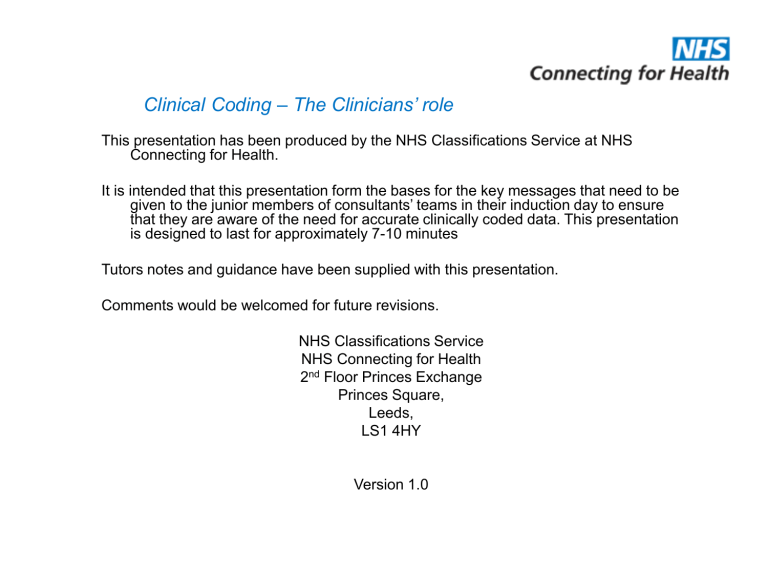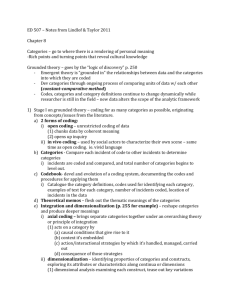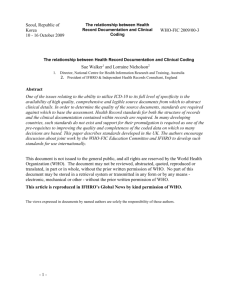Clinical Coding - The Clinicians Role

Clinical Coding
– The Clinicians’ role
This presentation has been produced by the NHS Classifications Service at NHS
Connecting for Health.
It is intended that this presentation form the bases for the key messages that need to be given to the junior members of consultants’ teams in their induction day to ensure that they are aware of the need for accurate clinically coded data. This presentation is designed to last for approximately 7-10 minutes
Tutors notes and guidance have been supplied with this presentation.
Comments would be welcomed for future revisions.
NHS Classifications Service
NHS Connecting for Health
2 nd Floor Princes Exchange
Princes Square,
Leeds,
LS1 4HY
Version 1.0
Clinical Coding
The Clinicians’ Role
Clinical Coding Department
What is Clinical Coding?
‘… the translation of medical terminology , as written by the clinician, to describe a patient’s complaint, problem, diagnosis, treatment or reason for seeking medical attention, into a coded format’ which is nationally and internationally recognised .
(NHS Information Authority, Clinical Coding Instruction Manual)
Main Classifications
ICD-10
• International
• Used to capture diagnostic clinical data
OPCS-4
• UK specific
• Used to capture surgical interventions
& procedures
Weekly Bills of Mortality
LONDON week ending 31st January 1634
The Diseases and Casualties this week
Abortive
Aged
Bedridden
Bloody flux
Bruised
Cancer
Chilbed
Chrisoms
Consumption
Convulsions
Cough
Dropsie
1
1
3
19
1
1
2
36
2
1
77
44
Males 107
Christened Female 109
In all 216
Executed
Feaver
Flox and smallpox
Found dead in the street (an infant)
33
10
5
French pox
Gripping in the guts
13
Jaundies
Infants
Killed with a fall
Murthered
Buried
1
1
1
18
3
1
Males 213
Females 196
In all 409
Overlaid
Quinsie
Rickets
Rising of the lights
Scowering
Scurvey
Stillborn
Stone
Stopping of the stomach
Suddenly
Teeth
Winde
Worms
Plague
Decreased in the buriels this week - 63
Parishes clear of the plague - 130 Parishes infected - 20
0
The assize of bread set forth by order of the Lord Mayor and Court of Aldermen
A penny wheaten loaf to contain eleven ounces and a half and three halfpenny white loaves the like weight
8
1
2
9
1
2
1
8
16
3
1
3
6
Accuracy is reliant upon…
The Clinician providing the information on the patient’s diagnoses and treatment
The Clinical Coder translating that information into the appropriate coded format to reflect the patient’s hospital stay
Accurate and Complete
Information
Complete diagnostic and procedural information is vital.
• Hepatitis
K75.9 Inflammatory liver disease, unspecified
• Acute Hepatitis
K72.0 Acute and subacute hepatic failure
• Alcoholic Hepatitis
K70.1 Alcoholic Hepatitis
Possible and ? Diagnoses
Chest Pain ?MI
Abdominal pain - possibly cholecystitis, possibly appendicitis
Chest pain investigations confirmed MI
Abdominal pain treated as appendicitis
Clinicians and Data Quality
The source documentation should:
• Be accurate and complete
• Reflect the patient’s episode of care
• Avoid the use of abbreviations
• Be clear and detailed
• Recording is legible and in indelible ink
Uses of Clinical Coded Data
Treatment effectiveness
Cost analysis
Commissioning
Clinical
Statistical
Clinical audit
Health trends
Clinical
Indicators
Florence Nightingale 1863
"I am fain to sum up with an urgent appeal for adopting … some uniform system of publishing the statistical records of hospitals.
There is a growing conviction that in all hospitals, even in those which are best conducted, there is a great and unnecessary waste of life … In attempting to arrive at the truth, I have applied everywhere for information, but in scarcely an instance have
I been able to obtain hospital records fit for any purposes of comparison … If wisely used, these improved statistics would tell us more of the relative value of particular operations and modes of treatment than we have means of ascertaining at present?"
Florence Nightingale in Notes on Hospitals, London: Longman,
Green, Roberts,Longman, and Green, 1863.
Important messages
The information that you write on the source documentation must:
• Be complete and accurate
• Reflect the patient’s episode of care
• Avoid the use of abbreviations
• Be clear and detailed
• Recording is legible and in indelible ink
Anything that is unclear about a patient’s stay the Clinical
Coding Department will clarify with the appropriate member of the consultant team to ensure accuracy in the clinically coded data.











